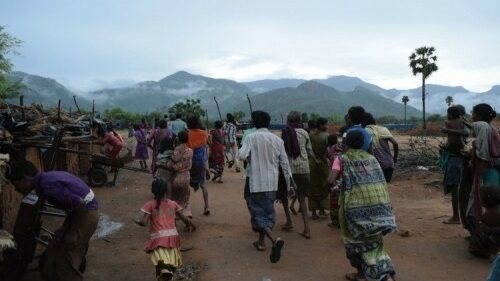Third Massive Slavery Rescue This Year Shows Disturbing Trend
Slavery
Another 117 former slaves are safely home this week following IJM’s third massive rescue operation with officials in India this year. The latest rescue took place at two brick factories in South India on Thursday, May 14, less than a month after 260 people were rescued in Bangalore. In February, another 333 slaves were rescued in IJM’s second largest operation to date. Each of the three rescues involved forced labor slaves relocated from Orissa, one of India’s poorest states in the central east region of the country.
“This rescue operation highlights a bigger trend we’re seeing. Traffickers know exactly where to look for cheap labor. Jobs are very difficult to find in Orissa, and droughts are not uncommon in the state,” explains IJM Chennai Director of Casework Alice Suganya.
How 117 People Were Trapped in Slavery
IJM helped local authorities rescue 117 forced labor slaves in an operation that started on Thursday, May 14. The survivors were taken to a local school that was large enough to house all of them, and the government officials interviewed each family to piece together their stories. They shared how the tragedy began eight months ago, when they took much-needed loans and promises of good jobs that would help them repay the loan.
Once they arrived in Tamil Nadu, India’s southernmost state, they realized they would be forced to work 18 hours a day and receive pennies for the back-breaking labor. But they did not speak the local language and had nowhere to turn for help.
The survivors told how the owners used physical and verbal abuse to intimidate them from attempting to stand up for their rights. In one case a man was severely and repeatedly beaten with a stick. They had no freedom of movement and no access to healthcare.
At the time of rescue, our social workers observed that the laborers looked extremely weak and malnourished,” said Alice Suganya. She was part of the IJM team that assisted with the operation, and they made sure the families had warm meals and understood what was happening as the interviews lasted all day Friday. Officials issued release certificates to 65 individuals—these legal papers emancipate the holder and cancel any alleged debt owed the owner.
A Bigger Trend
Over the weekend, IJM helped all of the families return to their home state by booking a special train car and ensuring vehicles were waiting on the other end to drive them home safely. The families are now enrolled in IJM’s two-year aftercare program for rescued slaves.
This rescue operation is indicative of a larger trend. “Just a couple months ago we helped Tamil Nadu state officials rescue 333 from a brick factory, and then 260 from other brick kilns in the neighboring state Karnataka. All of these people were migrant laborers from Orissa who were extremely vulnerable to predatory employers,” Alice explained.
Just last week IJM finished hosting a series of Freedom Trainings for families rescued earlier this year who have resettled in Orissa. Staff who were present observed that the families had seemed skeptical that anyone would stick around to help them. But IJM’s aftercare program is set up to help survivors for at least two years.
The first milestone is the Freedom Training, a three-day series of workshops designed to give people a crash course in basic life skills. Field workers will follow up with each family to help them make individualized treatment plans, and then monthly meetings will allow the survivors to gather together and hear seminars from IJM staff and other NGO leaders who can help them find jobs and troubleshoot a myriad of issues that will come up.
Alice adds, “Extending our aftercare program to another state has been a challenge, but it’s absolutely critical for the long-term success of the survivors. We don’t just want to just rescue people, we want to see them standing on their own two feet, thriving.”
Join IJM in taking a stand against slavery and everyday violence. Learn how by watching Gary Haugen's TED Talk.